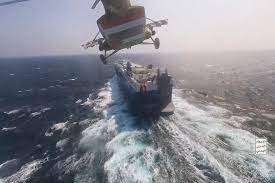Dr. Abdel Aziz Aluwaisheg
Houthi militiamen launched a complex attack toward international shipping lanes in the southern Red Sea on Tuesday, according to a statement by the US Central Command. They used Iranian-designed one-way attack drones, anti-ship cruise missiles and an anti-ship ballistic missile, according to the US statement. In addition to their complexity, the attacks were launched from Houthi-controlled areas of Yemen at about 9:15 p.m., indicating nighttime fighting capabilities.
Eighteen of the suicide drones, two anti-ship cruise missiles and the anti-ship ballistic missile were shot down by a combined effort of the US and UK military assets in the region, according to the American statement.
On Wednesday, led by the US, the UN Security Council condemned “in the strongest terms” the Houthi attacks on merchant and commercial vessels since Nov. 19, demanding that the group immediately cease all such attacks. The resolution called for “respect for the exercise of navigational rights and freedoms by merchant and commercial vessels in line with international law.” It gave tacit approval of US actions by “taking note” of the right of countries, in accordance with international law, to defend their vessels from attacks.
Although Houthi attacks on merchant shipping are in clear violation of international law, the speed with which the UNSC adopted this resolution indicated a clear double standard. Compare that to the council’s failure to pass a resolution condemning Israel and calling on it to stop its war against Gaza after more than 90 days of destruction and the death of more than 23,000 Palestinians, along with tens of thousands more injured and hundreds of thousands homeless. This double standard is highlighted and cynically exploited by groups such as the Houthis, with considerable resonance in the region, thus undermining the rule of international law and UN credibility.
In October, the Houthis launched missile and drone attacks against Israel, citing its war on Gaza. Although the attacks were apparently futile, the armed group gained popularity in Yemen and elsewhere for what it portrayed as standing up for the people of Gaza as they suffered under Israel’s brutal onslaught. The Houthis began targeting what they believed to be Israel-bound vessels in the Red Sea, garnering more political support as the war in Gaza intensified, with very little international action to stop Israel’s atrocities.
Since then, the Houthis have widened their stated aim to include all international shipping companies, until Israel allows full humanitarian supplies to enter Gaza. Houthi actions and warnings have caused many companies to divert ships far to the south around the Cape of Good Hope, driving up costs and threatening to disrupt the global supply chain, much of which goes through the Red Sea.
Tuesday night’s attack was believed to be the 26th on commercial shipping lanes in the Red Sea since Nov. 19, when the group started aiming at ships with no clear Israeli connections. The persistence of these incidents and the size of this week’s attack have demonstrated the group’s defiance. Tuesday’s incident came less than a week after 14 countries, led by the US, issued a joint statement warning: “The Houthis will bear the responsibility for the consequences should they continue to threaten lives, the global economy, or the free flow of commerce in the region’s critical waterways.”
The Houthis have not given any indication that they will stop, despite these warnings and US sanctions against individuals and entities associated with the group. They are benefiting from their increased political popularity and, as such, are not likely to heed the UNSC resolution issued on Wednesday night and let it restrain them. They have ignored past resolutions on the Yemen conflict, including Resolution 2216, which was issued under Chapter VII of the UN Charter.
While efforts should intensify to stop Houthi attacks against passing ships and threats to the international shipping lanes in the Red Sea, the international community should take a longer-term view and see beyond the current attacks. There are several essential but overdue steps that can be taken to secure this vital artery.
First, the international community should provide greater support for the ongoing Yemen peace process to ensure the success of the UN, Saudi Arabia and Oman’s mediation between the Yemeni parties. The UN special envoy has now presented a proposed roadmap toward a permanent ceasefire and political solution, which could include measures to reduce the use of anti-shipping attacks for political purposes – a clear motive for the recent attack by the Houthis.
Second, the newly deployed military capabilities in the Red Sea could help enforce the arms embargo imposed by UNSC Resolution 2216 in order to prevent the importation of missiles or missile components that can be used to threaten shipping. There are many gaps in the UN Verification and Inspection Mechanism for Yemen that was established under the resolution. It only inspects vessels exceeding 100 tons, allowing smaller boats to pass through, even if they carry suspicious loads. In addition, there have been consistent reports that ships exceeding 100 tons do evade its inspections in Djibouti.
Third, UN Verification and Inspection Mechanism inspectors should be allowed to fulfill their mandate by inspecting shipments in the Hodeidah port, as was originally intended, and not just in Djibouti. Similarly, staff at the UN Mission to support the Hodeidah Agreement should be allowed to exercise its role without hindrance. This mission was set up following the UN-mediated agreement between the Yemeni government and the Houthis that was signed in Stockholm in 2018 and endorsed by UNSC Resolution 2451. However, the UN Mission to support the Hodeidah Agreement’s movement and ability to carry out its mandate are currently severely restricted.
Fourth, the increased military presence could assist by gathering information about troop movement on the Yemeni mainland to provide early warning of impending attacks on shipping. Better reconnaissance would have the added value of monitoring violations of the UN-mediated truce on Yemen’s mainland. The truce has been holding more or less since April 2022 but needs better monitoring. Fifth, the clearing of sea mines deployed by the Houthis, which pose a mortal danger for shipping, is extremely important and is quite feasible with the added presence of military assets in the Red Sea. Sixth, as the UNSC resolution on Wednesday urged, there is an urgent need to “support capacity building efforts” of the Yemeni coast guard to “protect the sovereignty and integrity of the country” – a long overdue measure.
These and other similar measures are already included in previous UN resolutions on the Yemen conflict. It is the lax enforcement of those instruments that has allowed the Houthis to pose a threat to maritime security. Now is the time to put them into effect.
Arab News







